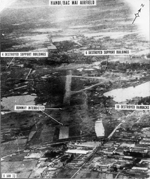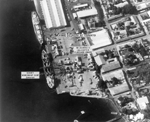JPEG
 (185.6 Kbytes)
(185.6 Kbytes)Aerial photo of bomb damage to a Hanoi Airfield.
Challenges facing DIA at this time included: the rise of Ostpolitik in Germany; the emergence of the Palestine Liberation Organization in the Mideast; and, growing arms control concerns. Riots in Gdansk, Poland, civil wars in Jordan and Nigeria, and the U.S. incursion into Cambodia from South Vietnam also drew intelligence interest. Other crises during this period included: Idi Amin's takeover in Uganda; unrest in Pakistan; the formation of Bangladesh; and, continued fighting in Southeast Asia.
On 3 November 1970, DoD created a position for an Assistant Secretary of Defense (Intelligence) (ASD/I) "to supervise Defense intelligence programs . . . and to provide the principal point for management and policy coordination with the Director of Central Intelligence, the CIA, and other intelligence officials outside the DoD." Also in November, President Nixon reorganized the national Intelligence Community and designated DIA's Director as program manager for the General Defense Intelligence Program (GDIP). Of significance, the Agency established a Directorate for Estimates in November 1970.
The Agency's reputation grew considerably by the mid-1970's as its products were increasingly perceived throughout the government as valuable to decisionmaking. Meanwhile, the specially-convened Williamsburg Conference in 1972 looked closely at the effects of DIA resource reductions. Among the recommendations of conference participants were to place increased emphasis on technology in the Agency and to upgrade the National Military Intelligence Center (NMIC). The General Counsel function was added that year, as well.
 (185.6 Kbytes)
(185.6 Kbytes)Aerial photo of bomb damage to a Hanoi Airfield.
In 1974, DIA established a J-2 Support Office to better satisfy JCS's intelligence needs; and, in October of that year, began a comprehensive overhaul of its production functions, organization, and management. Positions for Defense Intelligence Officers (DIO's) were established in December. The DIO's were given the responsibility of acting as the DIA Director's senior staff representatives on substantive intelligence matters.
Intense Congressional review during 1975-76 created turbulence in the national Intelligence Community. The Murphy and Rockefeller Commission investigations of charges of intelligence abuse ultimately led to an Executive Order that modified many of the functions the Community performed. Within DIA, the leadership adopted the "delegated production" concept to offset heavy production requirements, and a report from the Intelligence Management Study Group led to a reorganization of all DIA production activities.
By 1975--with American involvement in Vietnam ending-defense intelligence faced massive resource decrements. During this period, DIA conducted numerous studies on ways of improving its intelligence products. Ultimately, the Agency strengthened its support to consumers in OSD, the JCS, and the Unified & Specified Commands, and also modernized the National Military Intelligence Center. Faced with similar resource challenges, DoD also sought to centralize its activities. The ASD/I was designated Director of Defense Intelligence, a Defense Intelligence Board was established, and the President set up a National Foreign Intelligence Board.
In 1977, a charter revision further clarified DIA's relationship with the JCS and the Secretary of Defense. Specifically, the Secretary assigned staff supervisory responsibility over DIA in the resource area to the Assistant Secretary of Defense for Command, Control, Communications, and Intelligence, while giving the Assistant Secretary of Defense for International Security Affairs supervisory responsibility regarding policy matters. For a period during 1976 and 1977, DIA discontinued the positions of Deputy Director and Chief of Staff. Analytical efforts within the Agency at the time centered on the death of Mao Tse-Tung, aircraft hijacking, the Israeli raid on Entebbe Airport, unrest in South Africa, and continuing Middle East tension.
Following the promulgation in 1979 of Executive Order 12036, which restructured the Intelligence Community and better outlined DIA's national and departmental responsibilities, the Agency was reorganized around five major directorates: production, operations, resources, external affairs, and J-2 support. Despite these and other Community-wide efforts to improve intelligence support, the loss of resources during the 1970's limited the Community's ability to collect and produce timely intelligence and ultimately contributed to intelligence shortcomings in Iran, Afghanistan, and other strategic areas.
 (92.5 Kbytes)
(92.5 Kbytes)Port of Corinto, Nicaragua.